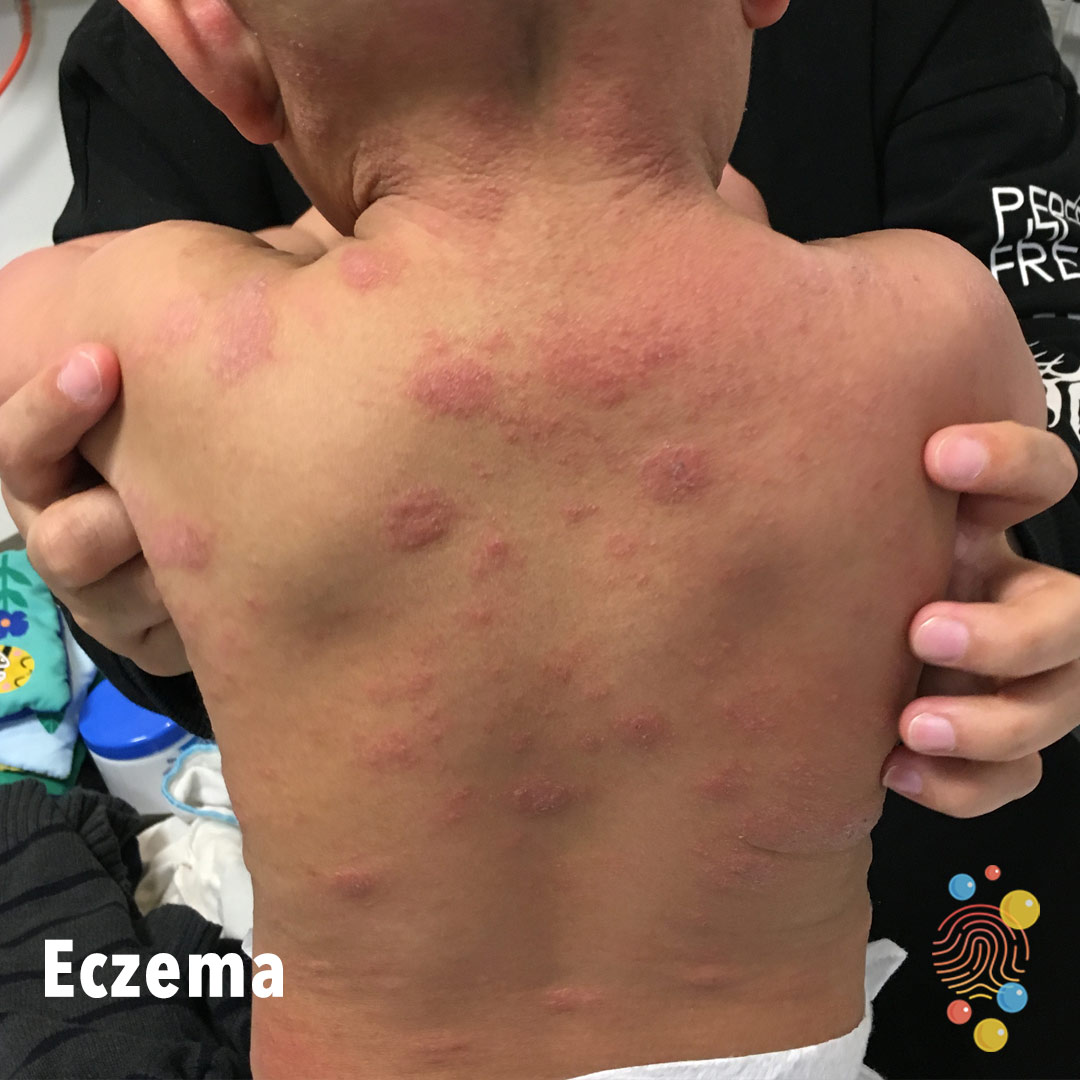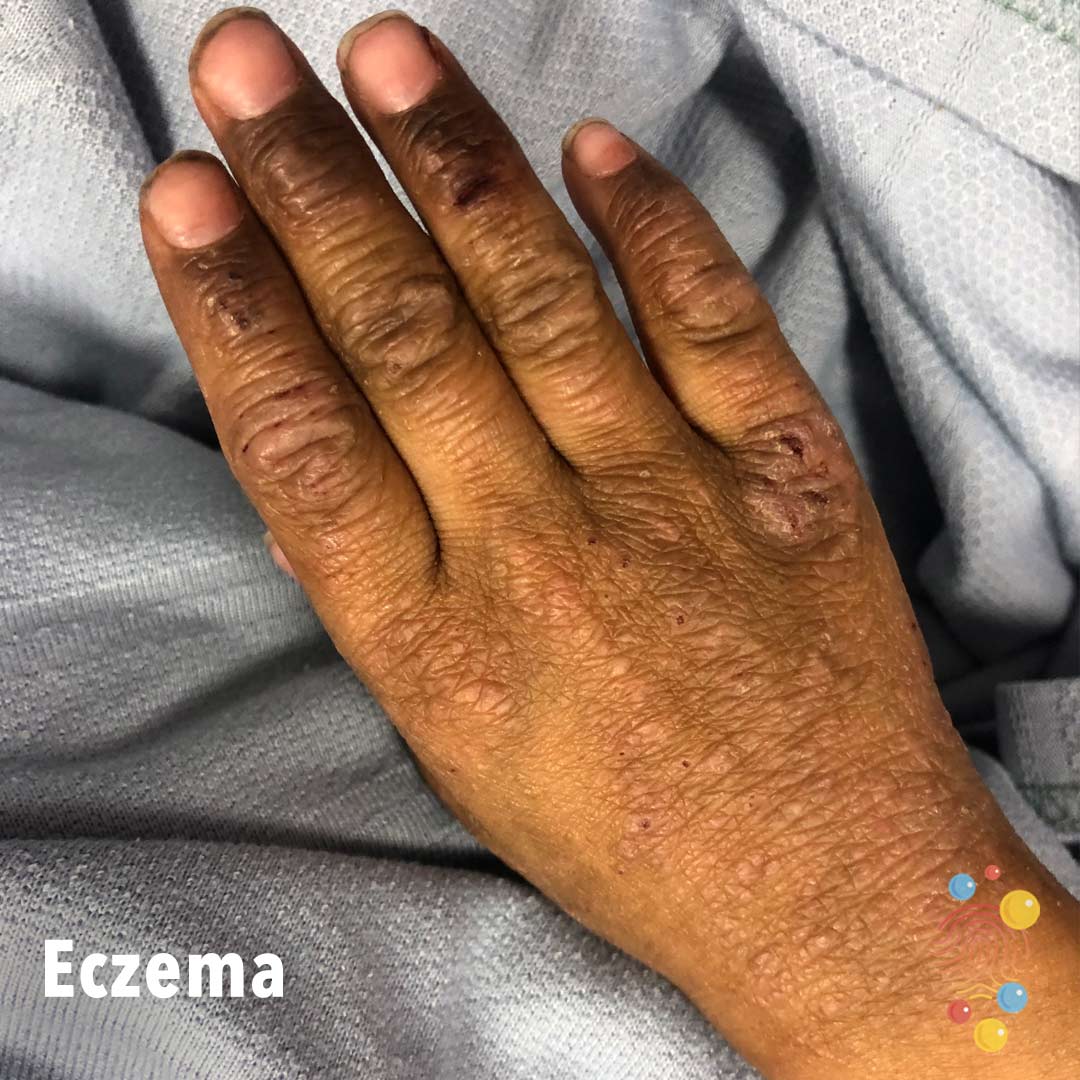Eczema
Eczema (dermatitis) is a common reason for a baby or child’s skin to be just dry or red (inflamed) as well. Eczema often runs in families as a part of the ‘atopic’ group of conditions that also include asthma, hayfever and food allergies. You do not inherit (pass down) a specific ‘atopy’ but more the tendency for ‘atopy’ which will be different in different people.

Eczema has many triggers that include:
- Irritants such as soap, clothing (wool, polyester), cigarette smoke, chlorine in swimming pools
- Changes in the climate such as drier air or temperature (too cold or too hot)
- Environmental allergens such as house dust mite, moulds
- When a child has a viral illness
- Hormonal changes
- Stress and anxiety can cause flares
- Rarely food
- Immediate reactions ( < 1 hour ) after eating
- Delayed reactions (4-6 hours) after eating with a flare of eczema
Treatment
- Dryness: moisturising cream or emollients which can be applied 4-5 times a day when the skin is very dry and once or twice a day when skin feels normal
- Redness (Inflammation): steroid creams are needed
- Infection: due to bacteria may need antibiotics and if your child skin is very red all over OR showing white head spots OR is broken down in lots of places. Infection can also be due to a virus (eczema herpeticum) with punched out ulcers which can be serious and need urgent medical attention
- Itch: this is due to skin dryness and inflammation and needs treatment as above. Occasionally you can use antihistamines but these should ideally not be used every day
Further Information
British Association of Dermatologists patient leaflet
Eczema society booklet for eczema.
Picture credit: Skin Deep is a project developed by two groups in the UK who aim to produce resources that educate professionals and public about skin presentations in children with different skin colours.

Where should you seek help?
- If it is non-urgent speak to your local pharmacist or health visitor
- If your child has any of the above features, urgently see your GP. For an urgent out-of-hours GP appointment, call NHS 111
- You should only call 999 or go to your nearest A&E department in critical or life threatening situations
For wear and tear, minor trips and everything in between.
Self-care
You can treat your child's very minor illnesses and injuries at home.
Some illnesses can be treated in your own home with support and advice from the services listed when required, using the recommended medicines and getting plenty of rest.
Sound advice
Children can recover from illness quickly but also can become more poorly quickly; it is important to seek further advice if a child's condition gets worse.
For information on common childhood illnesses go to What is wrong with my child?
Pharmacists are experts in many aspects of healthcare and can offer advice on a wide range of long-term conditions and common illnesses such as coughs, colds and stomach upsets. You don’t need an appointment and many have private consultation areas, so they are a good first port of call. Your pharmacist will say if you need further medical attention.
Sound advice
- Visit a pharmacy if your child is ill, but does not need to see a GP.
- Remember that if your child's condition gets worse, you should seek further medical advice immediately.
- Help your child to understand - watch this video with them about going to the pharmacy.
For information on common childhood illnesses go to What is wrong with my child?
Health visitors are nurses or midwives who are passionate about promoting healthy lifestyles and preventing illness through the delivery of the Healthy Child Programme. They work with you through your pregnancy up until your child is ready to start school.
Health Visitors can also make referrals for you to other health professionals for example hearing or vision concerns or to the Community Paediatricians or to the child and adolescent mental health services.
Contact them by phoning your Health Visitor Team or local Children’s Centre.
Sound advice
Health visitors also provide advice, support and guidance in caring for your child, including:
- Breastfeeding, weaning and healthy eating
- Exercise, hygiene and safety
- Your child’s growth and development
- Emotional health and wellbeing, including postnatal depression
- Safety in the home
- Stopping smoking
- Contraception and sexual health
- Sleep and behaviour management (including temper tantrums!)
- Toilet training
- Minor illnesses
For more information watch the video: What does a health visitor do?
School nurses care for children and young people, aged 5-19, and their families, to ensure their health needs are supported within their school and community. They work closely with education staff and other agencies to support parents, carers and the children and young people, with physical and/or emotional health needs.
Primary and secondary schools have an allocated school nurse – telephone your child’s school to ask for the contact details of your named school nurse.
There is also a specialist nurse who works with families who choose to educate their children at home.
Sound Advice
Before your child starts school your health visitor will meet with the school nursing team to transfer their care to the school nursing service. The school nursing team consists of a school nursing lead, specialist public health practitioners and school health staff nurses.
They all have a role in preventing disease and promoting health and wellbeing, by:-
- encouraging healthier lifestyles
- offering immunisations
- giving information, advice and support to children, young people and their families
- supporting children with complex health needs
Each member of the team has links with many other professionals who also work with children including community paediatricians, child and adolescent mental health teams, health visitors and speech and language therapists. The school health nursing service also forms part of the multi-agency services for children, young people and families where there are child protection or safeguarding issues.
If you’re not sure which NHS service you need, call 111. An adviser will ask you questions to assess your symptoms and then give you the advice you need, or direct you straightaway to the best service for you in your area.
Sound advice
Use NHS 111 if you are unsure what to do next, have any questions about a condition or treatment or require information about local health services.
For information on common childhood illnesses go to What is wrong with my child?
A&E departments provide vital care for life-threatening emergencies, such as loss of consciousness, suspected heart attacks, breathing difficulties, or severe bleeding that cannot be stopped. If you’re not sure it’s an emergency, call 111 for advice.



